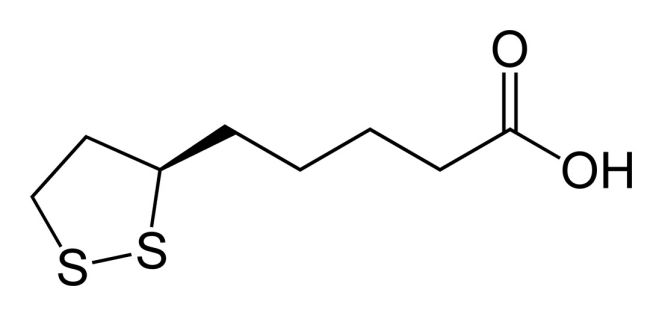Alpha Lipoic Acid
Longevity Benefits
- Stimulates the activity of mitochondria
- Activates autophagy, a cellular process that eliminates waste.
- Reduces inflammation and oxidative stress.

Quantity of ingredient in each package
Method of consumption, and precautions
Production process and inspection.
What is Alpha Lipoic Acid (ALA)?
Alpha lipoic acid is a naturally occurring compound found in every cell of the body. It's unique because it's both water and fat-soluble, allowing it to work throughout the body. ALA functions as a powerful antioxidant, protecting cells from damage caused by free radicals. But its benefits go far beyond simple antioxidant activity.
ALA: More Than Just an Antioxidant
ALA's true power lies in its multifaceted role in cellular health and metabolism:
Mitochondrial Support: ALA plays a vital role in mitochondrial function. Mitochondria are the "powerhouses" of our cells, responsible for energy production. As we age, mitochondrial function can decline, contributing to fatigue and other age-related issues. ALA helps support these vital cellular energy factories.
Blood Sugar Regulation: ALA has been shown to improve insulin sensitivity, helping the body regulate blood sugar levels. This is crucial for preventing insulin resistance and supporting metabolic health, both of which are linked to longevity.
Nerve Health: ALA has demonstrated potential benefits for nerve health, particularly in conditions like diabetic neuropathy. It may help protect nerves from damage and support their function.
Glutathione Production: ALA indirectly boosts the production of glutathione, another master antioxidant in the body. This synergistic effect amplifies the body's defense against oxidative stress.
Chelation: ALA can bind to heavy metals in the body, potentially aiding in their removal.
ALA and Longevity: The Connection
By supporting mitochondrial function, blood sugar regulation, and antioxidant defenses, ALA offers a multi-pronged approach to promoting healthy aging. While more research is needed to fully understand its long-term effects on longevity, the existing evidence suggests that ALA can be a valuable addition to a comprehensive longevity plan.
Incorporating ALA into Your Routine
ALA is found in small amounts in certain foods, such as red meat, spinach, and broccoli. However, supplementation can be a more reliable way to ensure you're getting an optimal dose.
Important Considerations:
Dosage: Consult with a healthcare professional to determine the appropriate dosage for your individual needs.
Form: ALA supplements are available in various forms, including capsules, tablets, and liquids. Discuss the best option with your doctor.
Interactions: ALA can interact with certain medications, so it's essential to discuss supplementation with your doctor, especially if you have any underlying health conditions.
Alpha lipoic acid is a naturally occurring compound found in every cell of the body. It's unique because it's both water and fat-soluble, allowing it to work throughout the body. ALA functions as a powerful antioxidant, protecting cells from damage caused by free radicals. But its benefits go far beyond simple antioxidant activity.
ALA: More Than Just an Antioxidant
ALA's true power lies in its multifaceted role in cellular health and metabolism:
Mitochondrial Support: ALA plays a vital role in mitochondrial function. Mitochondria are the "powerhouses" of our cells, responsible for energy production. As we age, mitochondrial function can decline, contributing to fatigue and other age-related issues. ALA helps support these vital cellular energy factories.
Blood Sugar Regulation: ALA has been shown to improve insulin sensitivity, helping the body regulate blood sugar levels. This is crucial for preventing insulin resistance and supporting metabolic health, both of which are linked to longevity.
Nerve Health: ALA has demonstrated potential benefits for nerve health, particularly in conditions like diabetic neuropathy. It may help protect nerves from damage and support their function.
Glutathione Production: ALA indirectly boosts the production of glutathione, another master antioxidant in the body. This synergistic effect amplifies the body's defense against oxidative stress.
Chelation: ALA can bind to heavy metals in the body, potentially aiding in their removal.
ALA and Longevity: The Connection
By supporting mitochondrial function, blood sugar regulation, and antioxidant defenses, ALA offers a multi-pronged approach to promoting healthy aging. While more research is needed to fully understand its long-term effects on longevity, the existing evidence suggests that ALA can be a valuable addition to a comprehensive longevity plan.
Incorporating ALA into Your Routine
ALA is found in small amounts in certain foods, such as red meat, spinach, and broccoli. However, supplementation can be a more reliable way to ensure you're getting an optimal dose.
Important Considerations:
Dosage: Consult with a healthcare professional to determine the appropriate dosage for your individual needs.
Form: ALA supplements are available in various forms, including capsules, tablets, and liquids. Discuss the best option with your doctor.
Interactions: ALA can interact with certain medications, so it's essential to discuss supplementation with your doctor, especially if you have any underlying health conditions.
